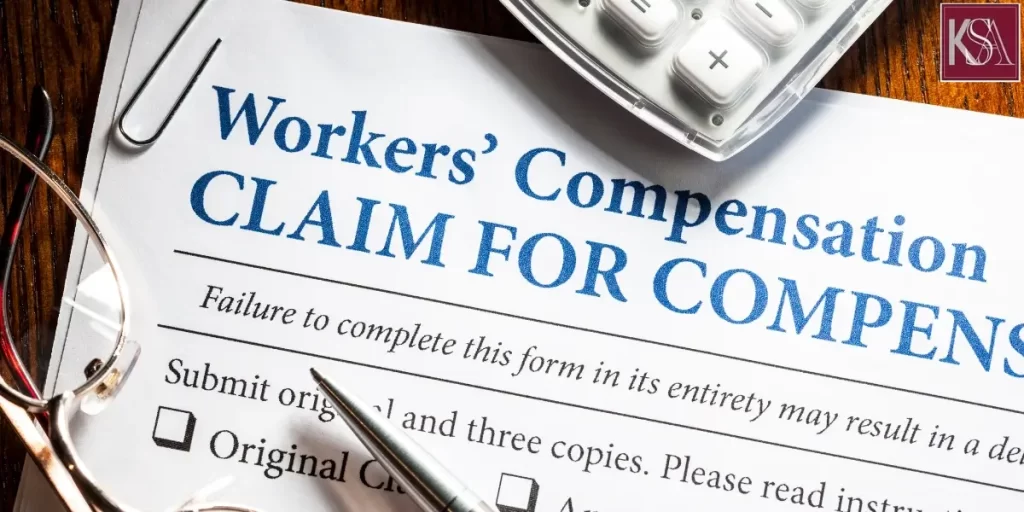If you experienced pain and suffering related to your workplace injury in California, you may have asked yourself, “Can I get pain and suffering compensation from workers’ comp in California?” Unfortunately, this type of compensation is not covered under workers’ compensation benefits. The lawyers at Kampf, Schiavone & Associates can help you understand strategies to receive compensation for pain and suffering after a workplace injury in California.

What Do Workers’ Compensation Benefits Actually Cover?
While workers’ compensation benefits do not explicitly cover pain and suffering, it is in place to provide financial and medical assistance to employees who have suffered work-related injuries or illnesses. Workers’ compensation covers necessary medical expenses such as doctor visits, hospital stays, physical therapy, necessary medical devices, and prescription medication. It also offers temporary disability benefits to compensate for lost wages. Workers’ compensation lawyers can help you navigate the complexities of the system and ensure you receive the full benefits you’re entitled to.
If an injury results in long-term impairments and conditions, workers may qualify for permanent disability benefits under workers’ compensation benefits. The total amount is typically based on disability ratings and employee wages. In the unfortunate event that a work-related illness or injury results in the death of a worker, their dependents may receive death benefits, which can compensate for funeral and burial costs and loss of financial support. Long-term disability care may also be available for workers who require ongoing treatment and assistance due to their injury or illness, and a workers’ compensation lawyer can help ensure you receive all the benefits you’re entitled to.
How To Get Compensated for Pain and Suffering After a Workplace Injury in California
Because workers’ compensation benefits in California do not cover losses like pain and suffering, it can leave workers feeling hopeless when their damages expand beyond the tangible. Getting compensation for pain and suffering can be challenging, but there are specific legal pathways that individuals can explore to pursue this compensation, including the following:
- Third-Party Personal Injury Legal Claim: If someone other than your coworker or employer contributed to your workplace injury, you may be eligible for a personal injury claim against them. An example of a third-party liability is defective equipment or a contractor’s negligence on a shared job site that led to your injury. A third-party settlement can affect workers’ compensation, as any compensation received from a third party may be deducted from your workers’ compensation benefits.
Compensation in these claims generally cover pain and suffering, emotional distress, loss of enjoyment of life, as well as economic losses like medical expenses and lost wages - Compensation for Psychiatric Injuries: While you cannot directly receive pain and suffering compensation through workers’ compensation, California does make way for workers to collect benefits relating to psychological injury and conditions that come up as a result of a workplace incident.
This may occur if an employee develops post-traumatic stress disorder from a serious accident. In order to prove this, you must have solid evidence, such as medical documentation from a mental health professional, and you must be able to show a link between the work-related incident and the psychological impact. - Permanent Disability Benefits: While permanent disability benefits do not explicitly cover pain and suffering, they do compensate for the long-term impact of an injury on an individual’s ability to work and enjoy life.
- Vocational Rehabilitation and Job Displacement Benefits: While vocational rehabilitation and job displacement benefits do not directly compensate for pain and suffering, these benefits can help improve your quality of life and overall financial stability if your injury impacts your ability to work.
- Personal Injury Claim Due to Serious and Willful Misconduct: It may be possible to pursue a personal injury claim if an employer’s conduct is considered serious and willful misconduct. In such cases, you can seek compensation for pain and suffering. Issues in personal injury claims can arise, especially when determining negligence and liability.
FAQs
Does California Workers’ Compensation Cover for Pain and Suffering?
No, California workers’ compensation does not cover pain and suffering as a part of its benefits. The workers’ compensation system is designed to give specific types of financial support to injured workers without regard to fault, and it will not cover non-economic damages like emotional distress and pain and suffering. In certain situations, individuals may pursue compensation for their pain and suffering through a dual claim or third-party claim.
What Is the Average Pain and Suffering Settlement in California?
The average settlement for pain and suffering in California can vary greatly depending on the details of each individual case. Pain and suffering compensation can depend on the severity of the individual’s injury, the impact on their life, and the circumstances surrounding the case. For more minor injuries, the settlement awarded will be smaller compared to more severe and life-altering injuries, which will result in higher settlements.
What Injuries Are Not Covered by Workers’ Compensation in California?
The types of injuries that are not covered by workers’ compensation in California include injuries that are not related to employment, self-inflicted injuries, injuries resulting from horseplay or fighting, injuries caused by substance abuse or intoxication, pre-existing conditions, injuries suffered by independent contractors, and injuries that happen due to breaking workplace rules.
How Can I Maximize My Pain and Suffering Settlement Amount?
There are many strategies available to maximize your pain and suffering settlement amount, but the key component to receiving a fair amount is adequately showing the full extent of the pain and suffering you have experienced due to the injury. Evidence can include witness testimonies, evaluations from psychologists and other medical professionals, and documentation of the pain and emotional suffering through self-recording.
Can a Lawyer Help Me Receive More in My Workers’ Compensation Settlement?
Yes, a lawyer can help you receive more money in your workers’ compensation settlement. Lawyers can assess and determine the full value of your claim and gather key evidence that proves the full extent of your injuries and losses. This is key in negotiating a higher settlement with insurance companies.
Get Legal Consultation for Workers’ Compensation Cases
If you experience pain and suffering from your work-related injury, you may feel helpless to get support for these intangible losses, as workers’ compensation benefits do not generally address this type of loss, but there are creative solutions. Reach out to the workers’ compensation lawyers at Kampf, Schiavone & Associates to set up an initial consultation and learn how our legal team can help you get the compensation you deserve for your pain and suffering.


